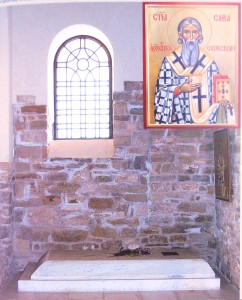Sava was born in 1169 A.D. He was the son of Stephen [Stefan] Nemanja the Grand Zupan of the Serbs. As a young man, Sava yearned for the spiritual life for which he fled to the Holy Mountain [Mt. Athos] where he was tonsured a monk and with rare zeal lived according to the ascetical rule. Stefan Nemanja followed the example of his son and came to the Holy Mountain where he was tonsured a monk and died as Simeon, the monk.
 Sava obtained the independence of the Serbian Church from the [Byzantine] emperor and patriarch and became the first Archbishop of the Serbs. Together with his father, he built the Monastery Hilendar and, after that, many other monasteries, churches and schools throughout the Serbian lands. On two occasions, he made a pilgrimage to the sacred places in the Holy Land. He restored peace between his two brothers who were estranged because of a struggle for power. He restored peace between the Serbs and their neighbors.
Sava obtained the independence of the Serbian Church from the [Byzantine] emperor and patriarch and became the first Archbishop of the Serbs. Together with his father, he built the Monastery Hilendar and, after that, many other monasteries, churches and schools throughout the Serbian lands. On two occasions, he made a pilgrimage to the sacred places in the Holy Land. He restored peace between his two brothers who were estranged because of a struggle for power. He restored peace between the Serbs and their neighbors.
In establishing the Serbian Church, he was, through that, establishing the Serbian State and culture. He instilled peace between all the Balkan peoples and worked for the benefit of all for which he was loved and respected by all the Balkan peoples. To the Serbian people he gave a Christian soul which did not perish with the collapse of the Serbian State.
Sava died in Trnovo, Bulgaria, during the reign of Emperor Asen, having become ill following the Divine Liturgy on the Feast of the Epiphany on January 12, 1236 A.D. King Vladislav translated his body to the Mileshevo Monastery from which Sinan Pasha removed it and burned it on Vracar in Belgrade, April 27, 1595 A.D.
Homily about the visions of the invisible world
“We look not to what is seen but to what is unseen”(2 Corinthians 4:18).
We see this material and transient world, but we look to that spiritual and immortal world.
We see earthly joy, often interrupted by tears and sighs and, in the end, always concluded in death; but we look to spiritual joy among the angels and saints of God in the heavens, to joy uninterrupted and eternal.
We see sufferings and failures of the righteous in this life; but we look at their glory and celebration in that world.
We see many successes, glory and honor of the unrighteous in this life, but we see their defeat, condemnation and indescribable torment in eternity.
We see the Church of God often humiliated and persecuted in this world, but we look to the final victory of the Church over all of her enemies and adversaries both visible and invisible.
Brethren, we often see tyrants and abductors as rulers and wealthy men in this age, and we see saints as poor, dejected and forgotten, but we look at the other kingdom, the Kingdom of God, eternal, sinless and immortal in which the saints will reign without one, no, not one tyrant or abductor.
O Lord, most patient and most merciful, open our spiritual vision that we may see that which awaits us after this short-lived life and that we endeavor to fulfill Your law.
To You be glory and thanks always. Amen.
Prologue from Ohrid by Saint Nikolai Velimirovic
